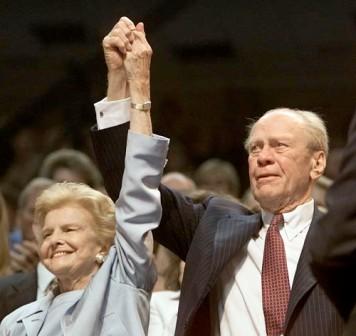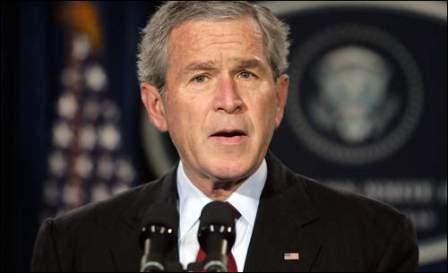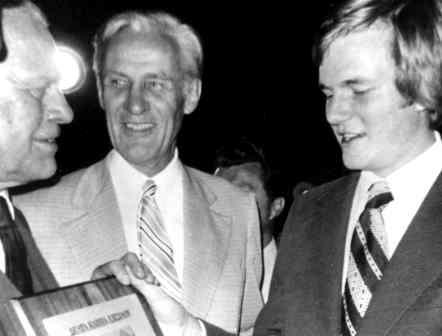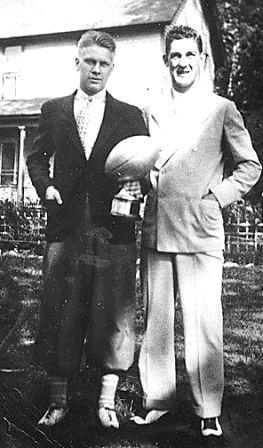|
Joe Skippers / Reuters Former U.S. President Gerald Ford and wife Betty Ford acknowledge the cheers from the crowd following a tribute in his honor at the Republican National Convention Aug. 1, 2000, in Philadelphia. Ford’s personal brand of Republicanism was marked by civility, moderation and solid relationships with members of Congress from both parties.
Tim Sloans / Getty Images President George W. Bush, Phi ’68, makes a live televised address to the nation (link) on the death of former President Gerald R. Ford, who joined DKE's Mystic Circle December 26, 2006. The President remembered Ford as “a gentleman who reflected the best in America’s character.”
This is the first time in history, and likely the only time, that two Presidents of the United States, both Dekes, have eulogized a Former President of the United States who also was a Deke.
Eulogy for Brother Ford by Former President Bush, Phi ’48.
Eulogy for Brother Ford by President Bush, Phi ’68.
President Ford, with his Omicron roommate Earl Townsend (center), receives a DKE plaque from Psi Phi Deke Milo Hanke, Jr. ’77.
Jerry Ford holds the trophy he received as the best freshman in spring practice while standing with University of Michigan football teammate Herman Everhardus, the man responsible for Ford becoming a Deke. |
Brother Gerald R. Ford, Jr., Omicron '35 Remembered A brother dead and brothers mourning Fill the heart with grief today, And the earnest grasp fraternal; Speaks, “a dear one passed away.”
Yes, no longer we shall greet thee In the halls of DKE, Yet thy name in sweet remembrance Graven on our hearts will be.
We have parted, Brother, parted, As we trust, to meet again, In a full unbroken circle, Free from sorrow, grief and pain.
In 1919, when Teddy Roosevelt, Alpha ’80, joined DKE’s Mystic Circle, Gerald Ford, the next Deke to live in the White House, was six years old.
Roosevelt surrounded himself with Dekes. His daughter, Alice, married Harvard Deke Nicholas Longworth, who served in the U.S. House of Representatives from 1902 – 12, while TR was in the White House. Longworth’s father and uncle also had been initiated at DKE’s Alpha Chapter at Harvard. Robert Bacon, Alpha ’80, was U.S. Secretary of State in the Roosevelt administration. George Meyer, Alpha ’79, was Secretary of the Navy and later Postmaster General, and Henry Cabot Lodge, Alpha ’71, was Senate Majority Leader.
Roosevelt’s favorite writer was fellow Alpha Deke Owen Wister. Newspaperman William Randolph Hearst, Alpha ’85, used his papers to promote the Rough Rider, and Indiana Senator Albert Beveridge, Psi Phi ’85, was the keynote speaker at the new Progressive Party convention which nominated Roosevelt for U.S. President in 1912.
While Michigan’s Gerald Ford wasn’t born into the life of privilege that awaited Roosevelt, he too pledged DKE, and he too surrounded himself with fraternity brothers. Ed Frey, Omicron ’31, was his campaign manager during his early political successes -- and there were many of those. Frey went on to be CEO of Union Bank.
The Ford Cabinet included several Dekes. The Secretary of Treasury was William Simon, Rho ’51. The Secretary of Interior and Commerce, Rogers C. B. Morton, was a Phi Deke in the Class of 1937. And Ford’s U.S Liaison to China, and later Director of the CIA, was George H. W. Bush, Phi ’48.
University of Michigan Dekes who knew the President recall a man similar to the one eulogized in media across the world today. But Ford’s DKE network extended beyond our brothers from Omicron. When Ford graduated from Michigan, he attended Yale Law School, and his classmates included Phi Dekes. Future Supreme Court Justice Potter Stewart ’37 was there, as was future Peace Corps Director Sargent Shriver ’38.
At Yale, Ford also served as assistant football coach and boxing coach, mentoring several Dekes on the football team, including future Senator Robert Taft, Jr., Phi ’39.
From the obituaries now honoring President Ford, we know he was the only U.S. President to be an Eagle Boy Scout. We know he was born Leslie Lynch King, Jr. in Omaha, Nebraska. His father left the family when Ford was two weeks old, his mother quickly moved to Grand Rapids where she married Gerald Ford Sr. nearly three years later, the couple began calling Mrs. Ford’s son Gerald R. Ford, Jr., and it wasn’t until Jerry was a senior at the University of Michigan that he legally changed his name, making Gerald Rudolph Ford, Jr. permanent.
Already permanent in Ford was a serious temperament. The newspapers repeat it, and the men who lived in the Omicron chapter house with Ford confirm it. “He’s everything everybody says about him,” said Earl Townsend, Omicron ’36. Townsend transferred to Michigan after his sophomore year at DePauw, where he was initiated at DKE’s Psi Phi chapter. His brother, John, was in Omicron’s 1938 graduating class. During his junior and senior years, living in the DKE House at 1912 Geddes, Earl was Ford’s roommate. (Click here for a brief piece on Earl in the Sun., 12/31/06, edition of The Indianapolis Star.)
“He made good grades. He was a studier. And he wanted to be a football coach after college,” Townsend said in an interview two days after the President’s death. Townsend celebrated his 92nd birthday a month before, and he held a photo of the Omicron chapter in 1936 as he talked. “He and I washed dishes for all three meals at the chapter house. It took us about an hour after each meal to get everything cleaned up,” he said. “We did it in return for board. That’s how most athletes got through school then. I played basketball, and Jerry and I became close friends through sports.
“I watched him play on the football team,” Townsend said. “Freddy Columbo was the team manager and also a Deke. I remember standing with Freddy the first night Jerry played as a regular, and I saw him get some terrible beatings.”
Ford played center and linebacker for Michigan and helped the Wolverines to undefeated seasons and national titles in 1932 and 1933. The team suffered a steep decline in his 1934 senior year, however, winning only one game. Ford was acknowledged as the team’s star nonetheless.
“Michigan had had a couple national championships, so everyone was out to beat us,” Townsend said. “In 1935, when Jerry was captain, we were short on backs. But along came the brother of another Deke, Chris Everhardus. His brother, Herman, already was in the chapter and on the team, and it didn’t take long for Chris to be in the chapter and on the team, too. He played like a demon. He was something else. I remember a hard game against Wisconsin, and Chris won that game. The guys all came back to the Deke House together and Jerry was so proud of Chris. Of course, we all were proud of Jerry because he was the center.”
More than 70 years after another game at Michigan, Townsend’s memory for the day and what happened is sharp. “Ford and Everhardus were two reliables who came out of that Class of 1935,” he said. “The Ohio State game was the last of the year at home. I remember I took Jerry home after that game. His legs were gone. He could hardly get into the house. The OSU team seemed to pick him out. Michigan lost that game 12 – 0, and the seniors came out to help take Jerry into the house. There were only three seniors that year, and we got him inside. He could hardly talk. For hours afterward, he just sat in his room.”
Ford himself later recalled: “During 25 years in the rough-and-tumble world of politics, I often thought of the experiences before, during, and after that game in 1934. Remembering them has helped me many times to face a tough situation, take action, and make every effort possible despite adverse odds.”
|



